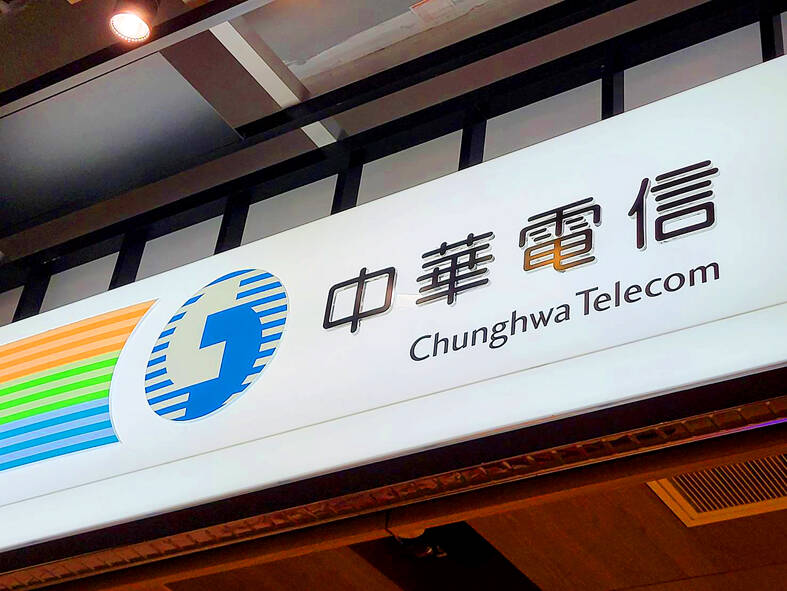Chunghwa Telecom Co (中華電信) has expanded into Europe for the first time after setting up a subsidiary in Frankfurt on Monday, the company said in a statement on Tuesday.
The subsidiary was launched at a ceremony presided over by the chairman of the European subsidiary, Chia Chung-yung (賈仲雍), and International Business Group president Richard Chen (陳錦洲), and streamed to Taipei via a video link.
In the statement, Chunghwa Telecom said it has sought to expand overseas, having already established subsidiaries in the US, Hong Kong, Japan, Singapore, Thailand and Vietnam, and that it was pleased to have a foothold on a new continent.

Photo: CNA
“Today, with the formal establishment of its European presence, Chunghwa Telecom has completed its international service network across Europe, America and Asia,” the company said.
“This makes it the only telecom operator in Taiwan with overseas branches and the most comprehensive global network deployment,” it said.
Chunghwa Telecom chairman Harrison Kuo (郭水義), who followed the ceremony in Taipei, was quoted in the statement as saying: “Wherever Taiwanese businesses go, Chunghwa Telecom will be there for them.”
The company decided to establish a presence in Germany, because it is one of Europe’s most important economic hubs and has attracted many Taiwanese enterprises, Kuo said.
Some analysts believed that Chunghwa Telecom’s move was related to Taiwan Semiconductor Manufacturing Co’s (TSMC, 台積電) establishment of an advanced fab in Germany, which broke ground on Tuesday last week.
Analysts said the company would target TSMC’s need for local network infrastructure and information and communications (ICT) solutions. Chunghwa Telecom declined to comment.
Chunghwa Telecom president Ivan Lin (林昭陽) said in the statement that the establishment of the European subsidiary was an important step in the company’s global expansion, and he pledged to work closely with local partners to meet the needs of Taiwanese businesses worldwide.
Chunghwa Telecom said that the EU market and its 27 member states presented many opportunities, and that Germany, as the bloc’s largest economy, serves as a gateway for multinational companies entering the European market.
The company plans to collaborate with European telecoms, Taiwanese businesses and ICT players in Germany, while continuing with collaborative projects with Poland-based Exatel SA, the statement said.
Chunghwa Telecom began working with Exatel, the largest fixed-line telecommunications company in Poland, last year, including launching a high-speed node network interconnection on July 21 last year, the statement said.

In Italy’s storied gold-making hubs, jewelers are reworking their designs to trim gold content as they race to blunt the effect of record prices and appeal to shoppers watching their budgets. Gold prices hit a record high on Thursday, surging near US$5,600 an ounce, more than double a year ago as geopolitical concerns and jitters over trade pushed investors toward the safe-haven asset. The rally is putting undue pressure on small artisans as they face mounting demands from customers, including international brands, to produce cheaper items, from signature pieces to wedding rings, according to interviews with four independent jewelers in Italy’s main

Japanese Prime Minister Sanae Takaichi has talked up the benefits of a weaker yen in a campaign speech, adopting a tone at odds with her finance ministry, which has refused to rule out any options to counter excessive foreign exchange volatility. Takaichi later softened her stance, saying she did not have a preference for the yen’s direction. “People say the weak yen is bad right now, but for export industries, it’s a major opportunity,” Takaichi said on Saturday at a rally for Liberal Democratic Party candidate Daishiro Yamagiwa in Kanagawa Prefecture ahead of a snap election on Sunday. “Whether it’s selling food or

CONCERNS: Tech companies investing in AI businesses that purchase their products have raised questions among investors that they are artificially propping up demand Nvidia Corp chief executive officer Jensen Huang (黃仁勳) on Saturday said that the company would be participating in OpenAI’s latest funding round, describing it as potentially “the largest investment we’ve ever made.” “We will invest a great deal of money,” Huang told reporters while visiting Taipei. “I believe in OpenAI. The work that they do is incredible. They’re one of the most consequential companies of our time.” Huang did not say exactly how much Nvidia might contribute, but described the investment as “huge.” “Let Sam announce how much he’s going to raise — it’s for him to decide,” Huang said, referring to OpenAI

The global server market is expected to grow 12.8 percent annually this year, with artificial intelligence (AI) servers projected to account for 16.5 percent, driven by continued investment in AI infrastructure by major cloud service providers (CSPs), market researcher TrendForce Corp (集邦科技) said yesterday. Global AI server shipments this year are expected to increase 28 percent year-on-year to more than 2.7 million units, driven by sustained demand from CSPs and government sovereign cloud projects, TrendForce analyst Frank Kung (龔明德) told the Taipei Times. Demand for GPU-based AI servers, including Nvidia Corp’s GB and Vera Rubin rack systems, is expected to remain high,